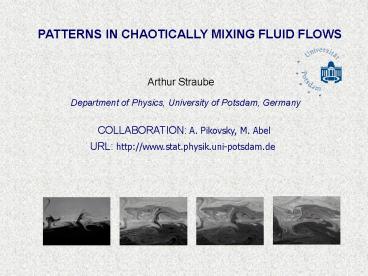Arthur Straube - PowerPoint PPT Presentation
1 / 19
Title: Arthur Straube
1
PATTERNS IN CHAOTICALLY MIXING FLUID FLOWS
Arthur Straube
Department of Physics, University of Potsdam,
Germany
COLLABORATION A. Pikovsky, M. Abel
URL http//www.stat.physik.uni-potsdam.de
2
- OUTLINE
- MOTIVATION
- - mixing in a relation to microfluidics
- - reaction-advection-diffusion systems variety
of patterns - TEMPORAL CHAOS VS SPATIAL MIXING
- - nontrivial transition spacially
homogeneous/spacially - inhomogeneous state (theory and numerical
simulation) - CHEMICAL INSTABILITY INDUCED BY MIXING FLOWS
- - mixing leads to homogenezation
- - can mixing destabilize homogeneous state?
3
PATTERNS AND MIXING IN CLOSED FLOWS
Passive scalar advection-diffusion
D. Rothstein, E. Henry, J.P. Gollub, Nature,
401, 770 (1999)
4
Blinking vortex with BZ reaction
C.R. Nugent, W.M. Quarles, T.H. Solomon, Phys.
Rev. Lett., 93, 218301 (2004)
advection-diffusion
reaction-diffusion
reaction-advection-diffusion
5
TEMPORAL CHAOS VERSUS SPATIAL MIXING
A. Straube, M. Abel, A. Pikovsky, Phys. Rev.
Lett. 93, 174501 (2004)
Diffusion of a scalar
Advection and diffusion
- 2D time-dependent flow mixing
Reaction
- One or two species fixed point or oscillations.
- Final state is homogeneous (completely mixed)
6
To allow for a nontrivial dynamics we consider
the dynamics of several species (three or more)
We start with the reaction equations
Additionally, each component is subjected to
advection and diffusion.
We also assume
- the velocity field is incompressible
- concentrations do not influence the flow
- no-flux/periodic boundary conditions
Reaction-Advection-Diffusion (RAD).
Spatio-temporal dynamics
7
Spatially homogeneous chaos
Spatially homogeneous solution advection and
diffusion terms vanish
solution of chemistry
Problem of stability
Linearization near the homogeneous solution
Jacobi-matrix
Stability is defined by the largest transverse
Lyapunov exponent
8
Analytical approach
- time-independent velocity field
- equal diffusion constants
Space eigenvalue problem
Time
Substitution
9
Asymptotic solution
decay of the advection-diffusion mode
Lyapunov exponent due to reaction (chemistry)
Thus
The critical reaction rate
10
Generalizations and further results
- time-dependent velocity field
- different diffusion constants
A simple 2D model (mixing) flow
T.M. Antonsen, et al., Phys. Fluids. 8, 3094
(1996)
Irregular (weakly turbulent)
is a - telegraph process with
independent exponentially distributed time
intervals and independent uniformly distributed
phases
11
Chaos meets chaos
Decay of the advection-diffusion mode
Time-independent velocity
Time-dependent velocity
12
Different diffuson constants. Connection with the
theory of synchronization
Numerical results
13
Partial case
Chemical and biological applications
- surface reactions
- processes in marine sediments
Here, the mobility of one species is zero
Numerical simulation of a fully nonlinear model
- Near the threshold linear
- growth of variances (contrast)
- Strong intermittency beyond
- stability threshold
14
Concentration patterns
Close to stability threshold
Far from stability threshold
15
CHEMICAL INSTABILITY INDUCED BY A MIXING FLOW
A. Straube, A. Pikovsky, in progress
RAD with time-independent reaction
Classical Turing instability (no advection)
16
Consider now the parameter region, where the
Turing patterns are not possible (without
advection) Influence of advection 1D shear flow
induces instability D.A. Vasquez, Phys. Rev.
Lett. 93, 104501, (2004).
17
Question can mixing flow cause instability?
- Both species are davected
- Only one species is advected
1D problem with a steady sinus profile
18
2D problem
Mixing flow can lead to instability for both
cases when one or two species are advected
19
(No Transcript)

